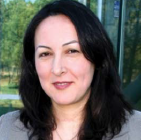-
Distinguished Lectures: Bio-enabled Materials through Biomimetics Molecular Design

Thu, Oct 24, 2013 @ 12:45 PM - 01:50 PM
Mork Family Department of Chemical Engineering and Materials Science
Conferences, Lectures, & Seminars
Speaker: Candan Tamerler, Mechanical Engineering & Bioengineering, University of Kansas
Talk Title: Bio-enabled Materials through Biomimetics Molecular Design
Series: Distinguished Lectures
Abstract: Nature has developed a wide range of ingenious solutions, which serve as valuable sources for inspiration when designing new materials and systems. Biological systems employ bio-molecular machinery tuned by evolutionary pathways to devise materials that bridges multiple length scales while providing diverse and outstanding properties. With a growing understanding of the molecular processes involved, biological principles are increasingly explored to develop novel bio-enabled approaches to materials science and engineering. The challenges in these strategies include controlling self-organization at a molecular level and thus provide control over the biological and inorganic interfaces under environmentally benign and biologically compatible conditions.
Proteins are key players in bio-molecular machinery by their ability to perform various tasks based on their functional specificity, their precise molecular recognition and their self-assembly capabilities. In addition to their role in biomineralization, proteins perform a wide spectrum of functions ranging from catalysis to self-regulation. Our inspiration has been to decode the foundations provided in biology`s highly organized and multifunctional structures and, thereby, to design advanced materials using biological principles. This results in a core of engineering well-defined peptide/protein based inorganic interfaces that serve useful functions (Fig. 1). In my talk, I will summarize the materials directed evolution of peptides by bridging combinatorial screening protocols to an engineered design for the targeted property. Building upon the modularity of protein domains, I will discuss the bio-enabled material and systems design approach, which deploy through single to multifunctional chimeric peptides or recombinant fusion proteins. With an extensive array of multifunctional molecular units, this approach promises to provide solutions to technological and medical areas that are built upon tunable interfacial interactions at the biomolecular-material interface. Specific examples will include i) bio-functionalization of surfaces, ii) developing multifunctional protein/peptide based hybrid nanoprobes for sensing and targeting, iii) addressable protein immobilization, and iv) bio-nano-fabrication routes for peptide enabled material synthesis and mineralization. Using biomineralization as an example, I will address: i) how combinatorial peptide design can be evolved over cycles of peptide generation towards translating mineralization formation capability to development of novel restorative and regenerative materials, ii) how material specific peptides can be explored in designing bacteria to mimic the material formation ability of cellular proteins through synthetic biology. The funding sources greatly appreciated are NIH-NIAMS, KU Internal & Endowment Funding Sources, LSDF, UW- CGF, NSF-BioMaterials, MRSEC at GEMSEC-UW and TUBITAK-International Office.
Host: Prof. Nutt
More Information: Candan Tamerler poster-2013.pdf
Location: James H. Zumberge Hall Of Science (ZHS) - 159
Audiences: Everyone Is Invited
Contact: Ryan Choi
This event is open to all eligible individuals. USC Viterbi operates all of its activities consistent with the University's Notice of Non-Discrimination. Eligibility is not determined based on race, sex, ethnicity, sexual orientation, or any other prohibited factor.




